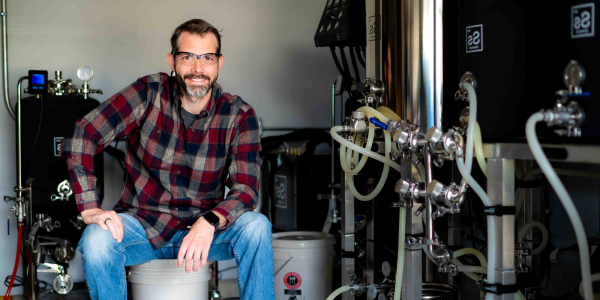Add a dash of creamer to your morning coffee, and clouds of white liquid will swirl around your cup. 但给它几秒钟, 这些漩涡就会消失, 留给你的是一杯普通的棕色液体.
Something similar happens in quantum computer chips—devices that tap into the weird properties of the universe at its smallest scales—where information can quickly jumble up, 限制这些工具的内存能力.
事实并非如此, 拉胡尔·南基肖尔说, 博彩平台推荐的物理学副教授.
理论物理学的新突破, he and his colleagues have used math to show that scientists could create, 本质上, a scenario where the milk and coffee never mix—no matter how hard you stir them.
The group’s findings may lead to new advances in quantum computer chips, potentially providing engineers with new ways to store information in incredibly tiny objects.
“Think of the initial swirling patterns that appear when you add cream to your morning coffee,南基肖尔说, 这项新研究的资深作者. “Imagine if these patterns continued to swirl and dance no matter how long you watched.”
Researchers still need to run experiments in the lab to make sure that these never-ending swirls really are possible. But the group’s results are a major step forward for physicists seeking to create materials that remain out of balance, 或平衡, for long periods of time—a pursuit known as “ergodicity breaking.”
研究小组的发现 本周出现 发表在最新一期的《博彩app推荐》上.”
量子存储器
这项研究, 其中包括合著者大卫·斯蒂芬和奥利弗·哈特, 博彩平台推荐的物理学博士后研究员, 这取决于量子计算中的一个常见问题.
Normal computers run on “bits,” which take the form of zeros or ones. Nandkishore解释说,量子计算机, 与此形成鲜明对比的是, 采用“量子位元,可以以零的形式存在, 一个或, 通过量子物理的奇异性, 0和1同时出现. 工程师们已经用各种各样的东西制造出了量子位, including individual atoms trapped by lasers or tiny devices called superconductors.
But just like that cup of coffee, qubits can become easily mixed up. 如果你翻转, 例如, 所有的量子位都是1, they’ll eventually flip back and forth until the entire chip becomes a disorganized mess.
在新的研究中, Nandkishore and his colleagues may have figured a way around that tendency toward mixing. The group calculated that if scientists arrange qubits into particular patterns, these assemblages will retain their information—even if you disturb them using a magnetic field or a similar disruption. That could, the physicist said, allow engineers to build devices with a kind of quantum memory.
“这可能是一种存储信息的方式,”他说. “You would write information into these patterns, and the information couldn’t be degraded.”
切入几何
在研究中, the researchers used mathematical modeling tools to envision an array of hundreds to thousands of qubits arranged in a checkerboard-like pattern.
The trick, they discovered, was to stuff the qubits into a tight spot. 如果量子位足够接近, Nadkishore解释, 他们可以影响邻居的行为, almost like a crowd of people trying to squeeze themselves into a telephone booth. Some of those people might be standing upright or on their heads, but they can’t flip the other way without pushing on everyone else.
The researchers calculated that if they arranged these patterns in just the right way, those patterns might flow around a quantum computer chip and never degrade—much like those clouds of cream swirling forever in your coffee.
“The wonderful thing about this study is that we discovered that we could understand this fundamental phenomenon through what is almost simple geometry,Nandkishore说.
研究小组的发现 could influence a lot more than just quantum computers.
Nandkishore explained that almost everything in the universe, 从咖啡到浩瀚的海洋, tends to move toward what scientists call “thermal equilibrium.“如果你往杯子里倒了一块冰块, 例如, 咖啡的热量会使冰融化, 最终形成温度均匀的液体.
他的新发现, 然而, join a growing body of research that suggests that some small organizations of matter can resist that equilibrium—seemingly breaking some of the most immutable laws of the universe.
“We’re not going to have to redo our math for ice and water,Nandkishore说. “The field of mathematics that we call statistical physics is incredibly successful for describing things we encounter in everyday life. 但在某些情况下,它可能不适用.”





